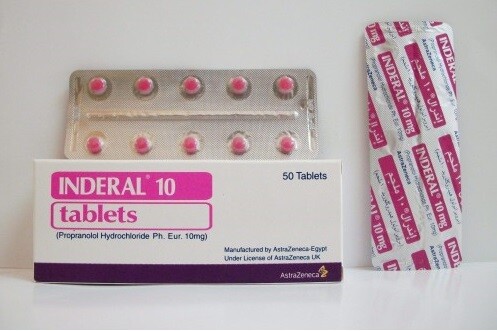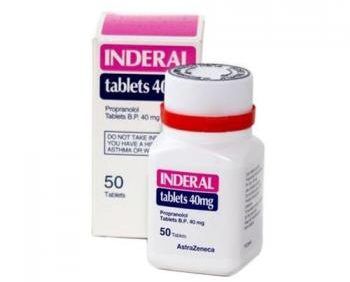Inderal (Propranolol)











Dosages
Inderal 10 mg
| Quantity | Price per pill | Total price | |
|---|---|---|---|
| 90 | $0.51 | $46.00 | |
| 180 | $0.34 | $61.00 | |
| 270 | $0.28 | $75.00 | |
| 360 | $0.26 | $93.00 |
Inderal 40 mg
| Quantity | Price per pill | Total price | |
|---|---|---|---|
| 90 | $0.56 | $50.00 | |
| 180 | $0.38 | $68.00 | |
| 270 | $0.32 | $86.00 | |
| 360 | $0.29 | $104.00 |
Inderal 80 mg
| Quantity | Price per pill | Total price | |
|---|---|---|---|
| 60 | $0.73 | $44.00 | |
| 90 | $0.59 | $53.00 | |
| 120 | $0.51 | $61.00 | |
| 180 | $0.44 | $79.00 | |
| 270 | $0.39 | $105.00 | |
| 360 | $0.37 | $132.00 |
Payment & Shipping
Your order is securely packed and usually ships within 24 hours. Below is what a standard package looks like.
It is about the size of a regular letter (9.4x4.3x0.3 inches) and shows no details about what is inside.



| Shipping Method | Estimated delivery |
|---|---|
| Express Free for orders over $300.00 | Estimated delivery to the U.S.: 4-7 days |
| Standard Free for orders over $200.00 | Estimated delivery to the U.S.: 14-21 days |









Discount Coupons
- Independence Day - July 4, 2026 10% JULY410
- Labor Day - September 7, 2026 7% LABOR07
- Thanksgiving - November 26, 2026 9% THANKS09
Brand Names
| Country | Brand Names |
|---|---|
 Argentina Argentina | Oposim Pirimetan Propalong Propaneitor Propayerst |
 Australia Australia | Cardinol Deralin |
 Brazil Brazil | Antitensin Betalevedim Cardbloc Cardiopranol Cardix Hipernolol Neo Propranol Polol Pradinolol Pranolal Propacor Propalol Propanox Proparil Propramed Propranol Propranolil Propranolum Rebaten Sanpronol Uni Propralol |
 Canada Canada | Detensol Novo-Pranol |
 Denmark Denmark | Propal Propranet |
 Finland Finland | Propral Ranoprin |
 France France | Adrexan Avlocardyl Beprane Hemipralon |
 Germany Germany | Beta-Tablinen Beta-Timelets Dociton Efektolol Elbrol Indobloc Intermigran Obsidan Propabloc Prophylux propra Propra-ratiopharm Propranur sagittol |
 Greece Greece | Dorizan Frina Kostalerg Waucoton Ziserfin |
 Hungary Hungary | Huma-Pronol |
 Malaysia Malaysia | Indon Propanol |
 Mexico Mexico | Acifol Europranolol Inderalici Pranoral Prochor Propalem Propalen Propalgin Propol Sintaser |
 New Zealand New Zealand | Angilol Cardinol |
 Norway Norway | Pranolol Pronovan |
 Portugal Portugal | Corpendol |
 Spain Spain | Sumial |
 Turkey Turkey | Dideral |
 United States United States | Betachron InnoPran |
| Manufacturer | Brand Names |
|---|---|
| Cipla Limited | Ciplar Propanolol Tablets Provanol |
| HAB Pharmaceuticals & Research Ltd. | Ciplar Propanolol Tablets Provanol |
| Intas Pharmaceuticals Ltd. | Ciplar Propanolol Tablets Provanol |
| Nicholas Piramal India Ltd. | Ciplar Propanolol Tablets Provanol |
FAQ
Description
Inderal is used to treat angina, tachyarrhythmias, acute ischemic attack prevention, migraine prophylaxis, and restless legs syndrome by reducing the sympathetic response. According to the National Library of Medicine, if slowing contractility and lowering a patient's heart rate is the intended goal, Inderal can be administered in practically all situations. In addition to being used off-label in many other situations, Inderal is also used in the treatment of anxiety, a psychiatric disorder that is a subgroup of social phobia and whose symptoms include flushing, tachycardia, and sweating due to the sympathetic nervous system being activated.
Indications
This medication is primarily used to treat tremors, hypertension, heart rhythm disorders, angina (chest pain), the majority of cardiac dysrhythmias, the prevention of upper gastrointestinal bleeding in patients with portal hypertension and oesophageal varices, the management of hypertrophic obstructive cardiomyopathy, the management of phaeochromocytoma post-operatively (with an alpha-blocker), and other heart or circulatory conditions. It also lessens the intensity and frequency of migraine headaches and treats or prevents heart attacks.
Your doctor may prescribe this medication for different reasons. If you would like additional information on this drug, contact your doctor.
Even if your health seems to improve, don't stop taking Inderal earlier than your doctor suggested. If you stop taking the drug too soon, it could make things worse. Until you know how this medication affects you, take caution when using machinery, driving, climbing, or performing other risky jobs. Avoid consuming alcohol. Never provide Inderal to a child without first consulting a physician.
Inderal is sold in packs of 10mg, 20mg, 40mg. Tablets are covered with film. Do not crush the tablet.
NDC: 60687-306, 0115-1659

Which Conditions or Symptoms Should I Inform a Doctor About Before Using This Medication?
If you currently have or have ever had any of the following conditions, you should see a doctor: depression; diabetes; pheochromocytoma; liver or kidney disease; allergy to Inderal or other foods, medicines, preservatives, or dyes; bronchitis, emphysema, or other breathing disorders; thyroid condition; heart problems, such as heart block, congestive heart failure, sick sinus syndrome, or slow heart rate; low blood pressure; circulatory issues (like Raynaud's syndrome).
Dosage
| Dosage | Instructions |
|---|---|
| 10 mg pill | Take one tablet orally every 2-4 times a day, along with a full glass of water or as directed by your doctor. |
| 20 mg pill | Take one tablet orally every 2-4 times a day, along with a full glass of water or as directed by your doctor. |
| 40 mg pill | Take one tablet orally every 2-4 times a day, along with a full glass of water or as directed by your doctor. |
| Oral Solution | A medicine dropper or spoon can be used to measure the recommended dosage. Swallow the dose right away after mixing it with a tiny bit of juice, water, or soft food. |
| Extended-release capsules | Swallow the entire capsule with a full glass of water, typically once daily in the morning or as directed by your doctor. |
Do not forget to take the medication regularly.
If you Forgot to Take a Dosage
Try to take the dose as soon as you remember if you miss it. Take just one dose if it's time for your next one. The dosage doesn't need to be doubled.
Excessive Intake
Any medication used in excess might have detrimental effects on your health. Get in touch with your healthcare provider right away if you suspect an overdose.
When Inderal is used in excess, it can be highly hazardous. Therefore, if a patient has taken too much Inderal, they should be made aware of the overdose warning signals and encouraged to get emergency medical attention.
Toxicity
More than one gram of Inderal used in 24 hours may be fatal and cause severe bradycardia, bradyarrhythmia, hypotension, and bronchospasm.
Glucagon should always be administered right away to a patient who appears to be overdosing on beta-blockers. Myocardial contractility, heart rate, and beta-blocker overdose have all been demonstrated to be significantly improved by glucagon.
Clinical Features of Heart
Bradycardia, hypotension, syncope, pulmonary edema, and cardiogenic shock can occur. Possible outcomes include asystole, ventricular tachycardia, first to third degree AV block, ventricular fibrillation, and QRS complex lengthening. Other cardioactive medications, including digoxin, cyclic antidepressants, calcium channel blockers, or neuroleptics, increase the risk of cardiovascular problems. Patients who are older or who have underlying ischemic heart disease are more vulnerable to severe cardiovascular impairment.
CNS
There may be drowsiness, disorientation, convulsions, hallucinations, dilated pupils, and, in extreme situations, coma. During resuscitation, neurological markers like coma or lack of pupil reactivity are not accurate predictors of recovery.
Hyperkalemia, bronchospasm, and sporadically CNS-mediated respiratory depression could happen.
How to Handle an Overdose
Treatment with Inderal must be discontinued in cases of overdose. General symptomatic and supportive measures should be part of the treatment, such as maintaining a clean airway and monitoring vital signs until they stabilize.
Patients who exhibit symptoms or have aberrant ECG results should be evaluated for an early conversation with critical care.
Possible Interactions
What May This Drug Interact with: digitalis (Lanoxin, digoxin); isoproterenol (Isuprel); an MAO inhibitor such as phenelzine (Nardil), isocarboxazid (Marplan), selegiline (Emsam, Eldepryl), rasagiline (Azilect), or tranylcypromine (Parnate); a blood thinner such as warfarin (Coumadin); haloperidol (Haldol); clonidine (Catapres); a heart medication such as reserpine (Serpasil), nifedipine (Adalat, Procardia), verapamil (Calan, Verelan, Isoptin), diltiazem (Cardizem, Cartia); dobutamine (Dobutrex); an antidepressant such as clomipramine (Anafranil), amitriptyline (Etrafon, Elavil), imipramine (Tofranil, Janimine), desipramine (Norpramin), and others; aspirin or other NSAIDs (non-steroidal anti-inflammatory drugs) such as naproxen (Naprosyn, Aleve), ibuprofen (Advil, Motrin), etodolac (Lodine), diclofenac (Voltaren, Cataflam), ketoprofen (Orudis), indomethacin (Indocin), and others; prazosin (Minipress), doxazosin (Cardura), terazosin (Hytrin); amiodarone (Pacerone, Cordarone), quinidine (Quinidex, Quinaglute, Quin-Release), propafenone (Rythmol); an ACE inhibitor such as captopril (Capoten), benazepril (Lotensin), enalapril (Vasotec), fosinopril (Monopril), moexipril (Univasc), lisinopril (Zestril, Prinivil), quinapril (Accupril), perindopril (Aceon), trandolapril (Mavik), ramipril (Altace).

Who Should Not Take Inderal?
Inderal usage is not recommended if bronchial asthma or bronchospasm have already occurred.
Patients with asthma have also been observed to experience a bronchodilator effect when administered intravenously with 1 to 2 mg of glucagon. Thus, in extreme situations, oxygen or artificial ventilation can be needed.
Like other beta-blockers, Inderal should not be administered to patients who have any of the following conditions: bradycardia; hypersensitivity; cardiac shock; metabolic acidosis; hypotension; severe peripheral arterial circulatory disturbances; sick sinus syndrome; second or third degree heart block; untreated phaeochromocytoma; Prinzmetal's angina; uncontrolled heart failure.
Hypoglycemic patients, such as those who have fasted for an extended period of time or have low counter-regulatory reserves, should not take Inderal. Patients who have chronic liver disease, diabetes, prolonged fasting, starvation, malnourishment, or concurrent use of medicines that impede the reaction to catecholamines are at risk for not responding appropriately to hypoglycemia.
This list of interactions may be incomplete. Give your doctor a complete list of all the medications, herbal remedies, nutritional supplements, and over-the-counter medications you take. Additionally, let them know whether you smoke, take illegal substances, or drink alcohol. Certain things might interfere with your medication.
FDA Category C of the Pregnancy
The safety of Inderal during pregnancy is not well understood. Take caution, as Inderal may damage the unborn child. For further information in greater detail, speak with your doctor. Take Inderal only after speaking with your physician. If you are nursing a baby, see your doctor before using Inderal.
Side Effects
| Serious Side Effects | Less Serious Side Effects |
|---|---|
| Fainting | Tired feeling |
| Feeling light-headed | Impotence |
| Confusion | Difficulty having an orgasm |
| Depression | Decreased sex drive |
| Hallucinations | Diarrhea |
| Allergy symptoms like difficulty breathing, hives, swelling of the face, tongue, or lips, skin rash, itching | Constipation |
| Swelling of feet and ankles | Stomach cramps |
| Irregular heartbeats | Sleep problems (insomnia) |
| Cold feeling in hands and feet | Nausea |
| Stomach pain | Vomiting |
| Loss of appetite | |
| Nausea | |
| Headache | |
| Feeling short of breath, even with mild exertion | |
| Low fever, jaundice (yellowing of the skin or eyes) | |
| Sore throat, severe blistering, peeling, and red skin rash | |
| Dark urine, clay-colored stools |
There could be other adverse effects; this is not an exhaustive list. Tell your medical professionals about every side effect you encounter.
Your doctor might tell you about maintaining a diet, managing your weight, and exercising. Pay close attention to the directions. When using this medication, regularly check your blood pressure. Inquire with your doctor if you require specific information.
Tell your dentist and doctors that you take Inderal, especially if you have surgery coming up.
Observing
Regular monitoring of a patient's blood pressure, pulse, and respiration rate is necessary while receiving Inderal medication. It is particularly crucial for people who have COPD, coronary artery disease, or any other ailment that beta-blockade may adversely influence. Frequent visits to primary care physicians or the use of portable blood pressure and pulse monitors at home are two options for regular monitoring. Physicians must modify dosages as necessary to attain the intended therapeutic results.
In the inpatient context, patients undergoing parenteral Inderal medication for disorders like thyroid storm will require continuous cardiac monitoring, usually accomplished by having the patient attached to continuous cardiac monitoring devices.
How to Store
Inderal should be kept at room temperature, between 15 and 30 degrees Celsius (59 and 86 degrees Fahrenheit), in a firmly closed container. Keep out of the light, heat, and moisture. Keep it away from sinks and bathrooms. Ensure children cannot get Inderal, and keep it away from animals.
The drug could make you tired or dizzy. Till you are sure of how this medication will affect you, avoid operating machinery, driving, or engaging in any other activity requiring mental focus. Steer clear of abrupt standing or sitting up, mainly if you are an elderly patient. This reduces the chance of having dizziness or fainting episodes.
You should speak with your doctor before using the medication. This page does not aim to cover all safety measures, medication interactions, side effects, usage, recommendations, and allergic reactions.









